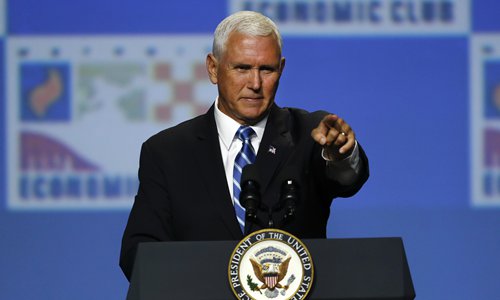HOME >> CHINA
Pence and Trump play 'bad cop/good cop' ahead of anticipated China-US summit: analysts
By Yang Sheng Source:Globaltimes.cn Published: 2019/10/25 3:32:16

Photo: IC
US Vice President Mike Pence delivered a hostile speech aimed at China during an event organized by the Washington-based think tank Wilson Center on Thursday and Chinese analysts said Pence and US President Donald Trump are playing the bad cop - good cop game before the highly anticipated China-US summit in November in a bid to gain leverage on trade talks.
Still, the vice president's latest remarks included positive signals compared to last year's speech, which indicated a consensus between both countries is increasing, analysts said.
Pence fired off comprehensive and harsh accusations, criticism, and a full-scale attack on China while covering issues like Xinjiang, Hong Kong, Taiwan, the South China Sea, trade, intellectual property, regional security, human rights, religion, and NBA tensions.
Pence's accusations were not new, like blaming China for taking advantage of an unbalanced or unfair relationship with the US. He also mentioned a few hot button issues like the turmoil in Hong Kong and claimed the US will "stand with" the protesters, despite the protests are getting more violent and losing control.
Pence is a Republican and an evangelical Christian. Among the pro-establishment camp of US political elites, he is more acceptable than Trump. He wants to strengthen and reinforce his image as a strong man who dares to offend China with excuses of "universal values" on human rights, democracy and freedom, which can help boost his approval rate and gain political capital, said Chinese experts.
"Pence is more suitable to play a 'bad cop' to use ideological issues to attack China. Since the leaders of China and the US are very likely to meet next month in the APEC summit, then the US side might believe that Pence's move to cause an intense atmosphere could add advantage for Washington on trade talks with Beijing," said Diao Daming, a US studies expert and an associate professor at Renmin University of China in Beijing.
Pence isn't the only one. Many politicians play the trick of provoking China, including US Secretary of State Mike Pompeo and Republican Senator Marco Rubio, because hostility toward China and criticizing Beijing can win support from nationalist and conservative forces and voters, observers noted.
Want a cold war?
During his tenure as Indiana governor, Pence issued congratulatory messages on the cooperation and exchange between Indiana and China's Zhejiang Province as they enjoy a sister province/state partnership. Pence was also a supporter of China-US exchanges, which makes him a pragmatic politician whose words and actions are driven by the political environment, Diao noted.
Compared with former Soviet Union, which competed with the US on every single hot spot issue during the Cold War, China is different and its intention to compete with the US is much weaker, because China was not interested or unable to compete with the US on many fronts globally, Diao said.
Chinese analysts believed that US politicians always want to create a "powerful enemy" to unite different forces within the US, since the country is suffering from many domestic problems including immigrants, gun control, racism and identity confusion, which makes China a perfect choice for such an imaginary enemy.
Diao added that the US used the great power game to win the Cold War against the former Soviet Union, so it might feel that another cold war would be something it is good at.
But for China, "we need to think carefully, do we want a cold war as well? Will the China-US relationship move into a great power competition just like what US politicians said? If the answer is no, then what is it, and what should we do?" Diao said.
Positive side
Li Haidong, a professor with China Foreign Affairs University's Institute of International Relations, told the Global Times the key target audience of Pence's speech are Americans and the elite. His speech was full of rhetoric praising and commending Trump, aiming to add leverage to the next year's election.
Pence's criticism of China shows US characteristics - attempting to "represent" Chinese to criticize their government, which indicates that US policymakers often confuse their identity when assessing China-US relations, thus their policy-making toward China is surely biased.
But Li also noted that compared with his last year's speech, the tone of this latest speech is more positive.
At the end of his speech, Pence said the US does not seek confrontation with China, and wants to cooperate with China on issues like the Korean Peninsula denuclearization, and the Persian Gulf situation.
"Despite the many challenges we face in the US-China relationship, the US will not allow these challenges to foreclose practical cooperation," Pence said.
This latest speech from Pence can be seen as a declaration on reconnecting with China compared with last year's, which was believed to be a declaration of a new Cold War, Li said.
The significant change and adjustment in the tone at least revealed that a consensus between China and the US is increasing, Li noted.
Posted in: DIPLOMACY